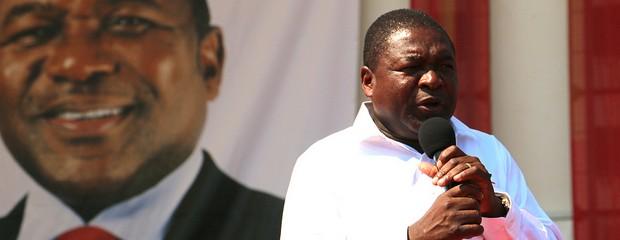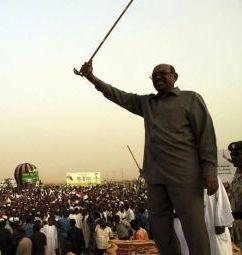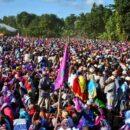Caring about conservation is not enough. We need to make it pay
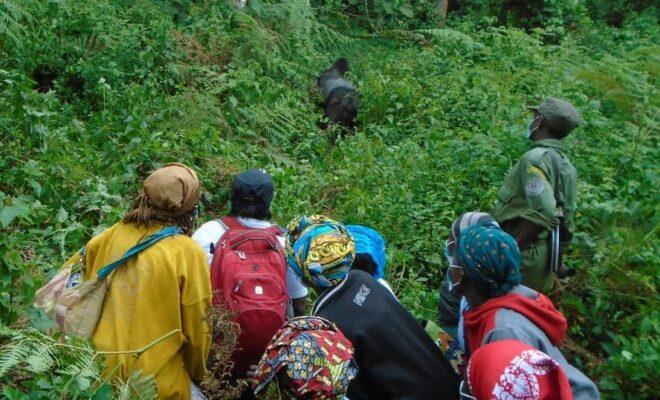
Local groups know how to protect nature and support local communities, but they need help with realistic funding and commercial expertise.
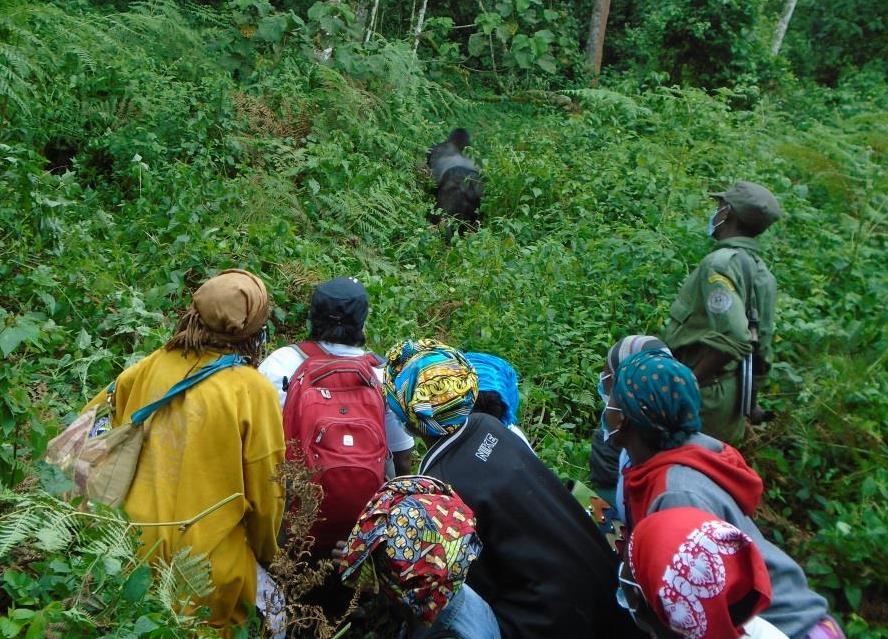
Local women watching gorillas in natural habitat in Kahuzi-Biega National Park. Credit: Pole Pole Foundation.
With climate change high on the agenda, the world is increasingly realising the importance of protecting biodiversity. This is much needed. However, there is a risk that well-intended interventions will spend a lot of money with minimal impact if they are poorly designed.
To avoid that fate, it is vital that community-led organisations are involved in the planning and delivery of conservation projects, that they are provided with secure long-term funding, and that they are supported by external expertise to scale up and commercialise projects. Local organisations usually have the best understanding of the local situation – and that understanding is crucial to designing effective interventions that ensure conservation supports both the protection of biodiversity and development.
I first learnt this 30 years ago while working as a Ranger in Kahuzi-Biega National Park in eastern Democratic Republic of Congo (DRC). I kept finding that the people we arrested for poaching were the same ones that I had grown up with. When I asked them why they poached, they replied “empty stomachs have no ears”. While I benefited from the park through my job as a ranger and tourist guide, they received nothing.
Most poachers are not malicious. They are just trying to earn an income to support their families. In areas of high unemployment and malnutrition, and where people are dependent on timber for building materials and charcoal for cooking, poaching and deforestation are inevitable unless people are given an alternative. They need support, not anger. With support, people can go from being poachers to protectors of nature. To protect biodiversity, we need to make conservation work for communities by creating jobs and incomes for local people. This model has been shown to work, such as in Namibia, where community conservation areas cover 20% of the country.
Money problems
Community-led conservation programmes understand this and know what needs to be done, but they often have trouble accessing funding. Grant applications and the paperwork associated with them are getting longer every year. That paperwork must all be filled in, often in a second or third language, without any certainty over whether an organisation will receive a grant. If grant-funding is received, it is short term and still carries a heavy burden of paperwork. For small organisations with few resources, all of which are focused on saving wildlife and supporting communities, this burden makes it very challenging to plan for the long-term and leads to people spending more time in the office than out in the field doing their job.
Having an audit trail for funding is of course important – all organisations need to be held to account for their spending – but the paperwork burden means that, increasingly, only those able to hire professional grant application writers can receive funding. Such a situation creates a divide within the sector and means more money is going to consultants and less to the field. By way of example, the UK government’s IWT Challenge Fund application runs to over 20 pages for just the initial “stage 1” proposed project summary.
Short-term funding also makes long-term planning difficult. Many of our colleagues have been involved in projects that worked well at first, but then failed due to a lack of continued funding. We all work in difficult environments, but uncertainty over funding is like operating with one hand tied behind our back. It also leads to ineffective use of grant money as projects are not seen through to the end.
A better process would be to identify promising organisations and provide them with funding and support for a minimum of five years. Organised crime groups and illegal loggers involved in poaching and deforestation offer a reliable source of funds for those they recruit. If we cannot do the same, our efforts to save nature and support communities are doomed to fail.
Making conservation pay
Challenges over grant funding point us towards another piece of the puzzle that does not get nearly enough attention: accessing commercial finance to scale our approaches to truly make conservation pay.
Eco-tourism is often held up as the commercial solution to conservation, and many successes have been achieved combining eco-tourism with community engagement such as Mountain Gorilla conservation in Rwanda. However, as the recent pandemic has shown (and as we knew before, having seen the effects of conflict on eco-tourism in the DRC) being dependent on tourism exposes projects to permanent weaknesses.
We need to diversify our revenue sources and find more ways to create jobs. Because if conservation can provide income, revenue, food and resources to communities, nature will be protected. In simple terms, if it pays it stays.
We have launched several successful projects in this space, such as our Spirulina nutrition centre and Vegan Club. Both projects were developed using outside expertise combined with our understanding of what needed to be delivered on the ground, namely a solution to malnutrition. But these projects are still small scale. We need bigger “buffer zones” around national parks where commercial activity can take place, providing jobs and revenue, and keeping people and wildlife separate to avoid conflict. Initiatives like COMACO in Zambia have shown one way with their “It’s Wild” brand supporting farmers who otherwise might have become poachers to earn a living, but we need more programmes like it.
Crucially, community projects cannot deliver large-scale commercial solutions by themselves. They need outside expertise. Not simply people who mean well and care about wildlife, but those with commercial experience who know what makes a good business and how to launch and scale commercial enterprises. With their support to develop successful “bioeconomy” businesses, we can create the jobs and revenue to make sure conservation pays and communities benefit.
Me and my team at the Pole Pole Foundation know what needs to be done, as do many other community-led organisations like us, but we don’t always know how to do it. We need support from outside experts to help build our skills, knowledge, and experience to develop the commercial solutions required to protect nature and provide development to surrounding communities and the country at large. This is eminently achievable, but it needs to be done right, utilising knowledge from community organisations, providing long-term finance to ensure continuity, and partnering with experts to scale and expand our impact.
Then, slowly but surely, we will protect nature and help the people and countries that protect nature prosper. We can, we shall, and we must.
The Pole Pole Foundation was honoured to be nominated by RAS and recognised as one of fifteen finalists in the inaugural Earthshot Prize 2021. As finalists, they are sharing their blueprint for national park conservation, working to influence donors, governments, conservationists and commercial organisations to deliver best practice around the world.


